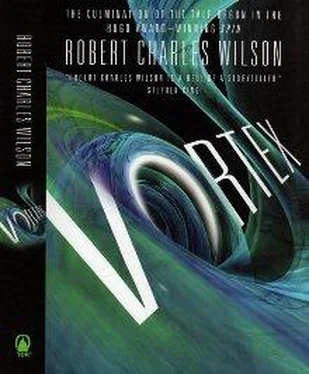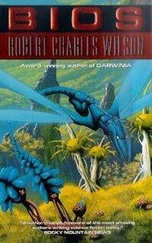In time the Hypotheticals began to actively cultivate organic civilizations.
There was no agency in this, only a blind acquisitiveness. The Hypotheticals evolved in ways that maximized their exploitation of sentient organisms. Early in the history of the galaxy, an organic civilization had constructed twin Arches in order to colonize the marginally habitable planet of a neighboring star—the species suffered decline and extinction soon after, but its technology was analyzed and adopted by the Hypotheticals. In the same way the Hypotheticals had learned to extract energy from stellar cores and gravity gradients, to manipulate atomic and molecular bonds, to order and stabilize the exchange of information over distances of hundreds of light years. Eventually the Hypotheticals had developed a means of extending the useful life of such species. If a fecund mother planet was suspended inside a temporal distortion while a system of Arches was put in place—as the Earth had been suspended during the Spin—that planet’s resource base could be expanded tenfold; its organic civilization would spill into new worlds and flourish on them, cycling through epochs of decline and expansion, reliably generating new and exploitable technologies.
Such organic species remained mortal and eventually died, of course. All biological species did. But the harvest of ruins increased exponentially.
* * *
Allison and Turk arrived at Vox Core in the storms that followed the collapse of the Arch and the dismantling of the systems that had for so many years protected Earth from its ancient, dying sun.
I welcomed them back and explained what had happened. I told them I could defend them even from the destruction of this superannuated planet—I had grown that powerful, and in a very short span of time.
But they were shocked by the deaths that had taken place. For days they wandered the empty corridors of the city. The rooms they once shared had been carved away in the initial attack of the disassemblers; they could have chosen any of tens of thousands of abandoned suites and rooms in which to make a home, but Allison told me she was unnerved by everything the dead had left behind them… the unsorted possessions, the place settings abandoned on tables, the nurseries without children. The city was full of ghosts, she said.
So I built them a new residence in a forested tier deep to starboard, using the city’s fleet of robotic constructors. I chose a location far from the public corridors, accessible by footpath. The tier’s artificial sunlight was bright and convincing, its ambient temperature consistently pleasant, its average humidity low. The recycling system stirred up gentle breezes every morning and evening, and rain fell every fifth day.
They agreed to live there until they found a better home.
* * *
I believed there might be a better home for them, though not on Vox, and certainly not on Earth. But most of my attention was occupied with the business of keeping Vox Core intact in an increasingly harsh environment.
At the equator of the Earth the oceans had begun to boil. Cyclonic winds scoured the lifeless continents, and the atmosphere grew thick with superheated water vapor. Monstrous surge tides threatened to force what remained of Vox into the rocky Antarctic shelf. And it would only get worse.
I needed to manipulate very powerful Hypothetical technology, which meant extending and elaborating my control of it.
I was able to call down from orbit a small fleet of nanoscale devices—versions of the disassemblers that had first swarmed us—to encase and protect Vox Core. Scalding waves crashed over the rocky part of the island and broke against the city’s jagged towers, but the city itself remained stable, temperate, and undisturbed. Preserving this equilibrium required gigajoules of energy, drawn directly from the heart of the sun.
It was still little more than a stopgap. Before long we would need to leave the planet altogether. I believed I could accomplish that, though it would necessitate an even greater disconnection between my mortal body and my mind.
Often during this time, walking through the passageways of Vox Core, I was startled by the sight of my reflection in a glassy surface—by the reminder that I was still a collation of blood and bone and tissue, bearing the scars of my forcible reconstruction. And the subtler scars of less visible injuries.
My father had made me what I was because he had believed in the power of the Hypotheticals to liberate humanity from death. The Voxish religion had fostered a similar belief, a programmed limbic rebellion against the tyranny of the grave.
And now the stone had rolled away, revealing only the weakling prophet of a mindless god. How disappointed my father would have been!
* * *
“I can control the passage of time,” I told Turk and Allison. “Locally, I mean.”
Although they were my friends, they were afraid of me and of what I was becoming. I didn’t blame them for that.
I had come to visit them in their home in the forest. The house I had built for them was as pleasant as I had planned it to be. The trees beyond the windows were tall and graceful. The air that whispered through the portcullis smelled of living things. They asked me to sit down at their table. Allison offered me fruit from a bowl and Turk poured me a glass of water. I was too thin, Allison said. It was true that lately I had been forgetting to eat.
I told them about the world outside. The bloated sun was scouring away the Earth’s atmosphere. Before long the crust of the planet itself would begin to melt, and Vox would be afloat on a sea of molten magma.
“But you can keep us alive,” Turk said, repeating what I had told him weeks ago. “Right?”
“I believe I can, but I don’t see the point in staying here.”
“Where is there to go?”
The solar system wasn’t entirely inhospitable, despite the swollen sun. The Jovian and Saturnian moons were relatively warm and stable. Vox could have sailed indefinitely on the blue-gray seas of Europa, for instance, under an atmosphere no more toxic than Earth’s.
“Mars,” Allison said suddenly. “If you’re serious, I mean if we can really travel between planets—there’s an Arch on Mars—”
“No, not anymore.” The Hypotheticals had protected Mars as long as there was a human presence there. But the last native Martians had died centuries ago and their ruins had been thoroughly scavenged; in recent decades the Arch had been allowed to decay and collapse. (I extracted this knowledge from the Hypotheticals’ pool of data, which had become my second memory.) Mars was a closed door.
“But you’re saying Vox Core can function as a kind of spaceship,” Allison persisted. “How far can it go, how fast?”
“It can go almost any distance. But only at a very small fraction of the speed of light.”
She didn’t have to explain what she was thinking. The planets that comprised the Ring of Worlds were linked by Arches but separated by vast physical distances. Some of these distances had been calculated by astronomers even in Turk’s time. The nearest human world was more than a hundred light-years from Earth. Reaching it would take several lifetimes. “But I can modify the passage of time so that it would seem like much less. A few hundred days, subjectively.”
“But it won’t be the same Ring of Worlds when we get there,” Allison said.
“No. Thousands of years will have passed. It’s impossible to predict what you might find.”
She looked out at the forest. Beams of artificial sunlight raked through the trees like bright, vague fingers. The tier’s high ceiling was the color of cobalt. No birds or insects lived here. There was no sound but the rustling of leaves.
Читать дальше












